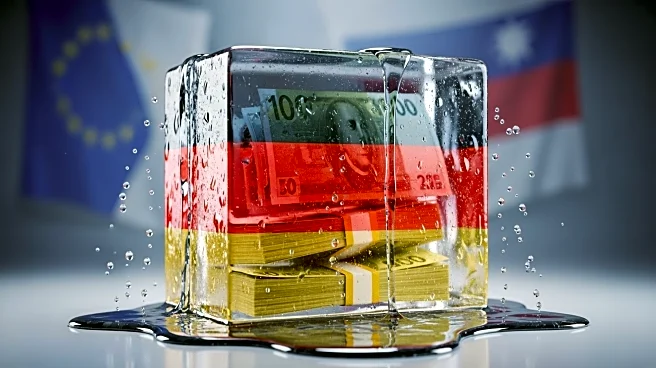What's Happening?
Germany has shifted its stance and now supports using frozen Russian sovereign assets to fund Ukraine's needs, according to Bloomberg. This change comes amid concerns that the U.S. might reduce its aid to Ukraine, potentially placing a greater financial burden on Germany. The Group of Seven (G7) countries initially froze approximately $300 billion in Russian central bank assets at the onset of Russia's full-scale invasion in 2022. European governments and G7 allies have been exploring ways to generate revenue from these immobilized funds. The European Commission President Ursula von der Leyen mentioned that the EU is considering providing Ukraine with a reparations loan funded by the cash balance associated with these frozen assets. Discussions on generating further revenue from the assets are expected to take place at an upcoming EU finance ministers meeting in Copenhagen and at the EU leaders' summit in October.
Why It's Important?
The decision to utilize frozen Russian assets for Ukraine's needs is significant as it represents a shift in international financial strategies to support Ukraine amidst ongoing conflict. This move could alleviate some of the financial pressures on European countries, particularly Germany, if U.S. aid diminishes. The use of these assets could provide Ukraine with much-needed financial resources to sustain its defense against Russian aggression. Additionally, this development highlights the evolving geopolitical dynamics and the role of financial measures in international conflict resolution. The decision could set a precedent for how frozen assets are used in future conflicts, impacting international financial and diplomatic policies.
What's Next?
A final decision regarding the use of frozen Russian assets is expected to be made during the EU leaders' summit on October 23-24. This decision will likely involve discussions on the legal and financial implications of using these assets for Ukraine's needs. The outcome could influence future EU and G7 policies on asset management in conflict situations. Stakeholders, including EU member states and financial institutions, will be closely monitoring these developments to assess the impact on international financial systems and geopolitical relations.
Beyond the Headlines
The ethical and legal dimensions of using frozen sovereign assets for conflict-related reparations are complex. This approach raises questions about the precedent it sets for international law and the handling of sovereign assets in future conflicts. The decision could influence global norms regarding asset seizure and reparations, potentially affecting international relations and financial policies.










